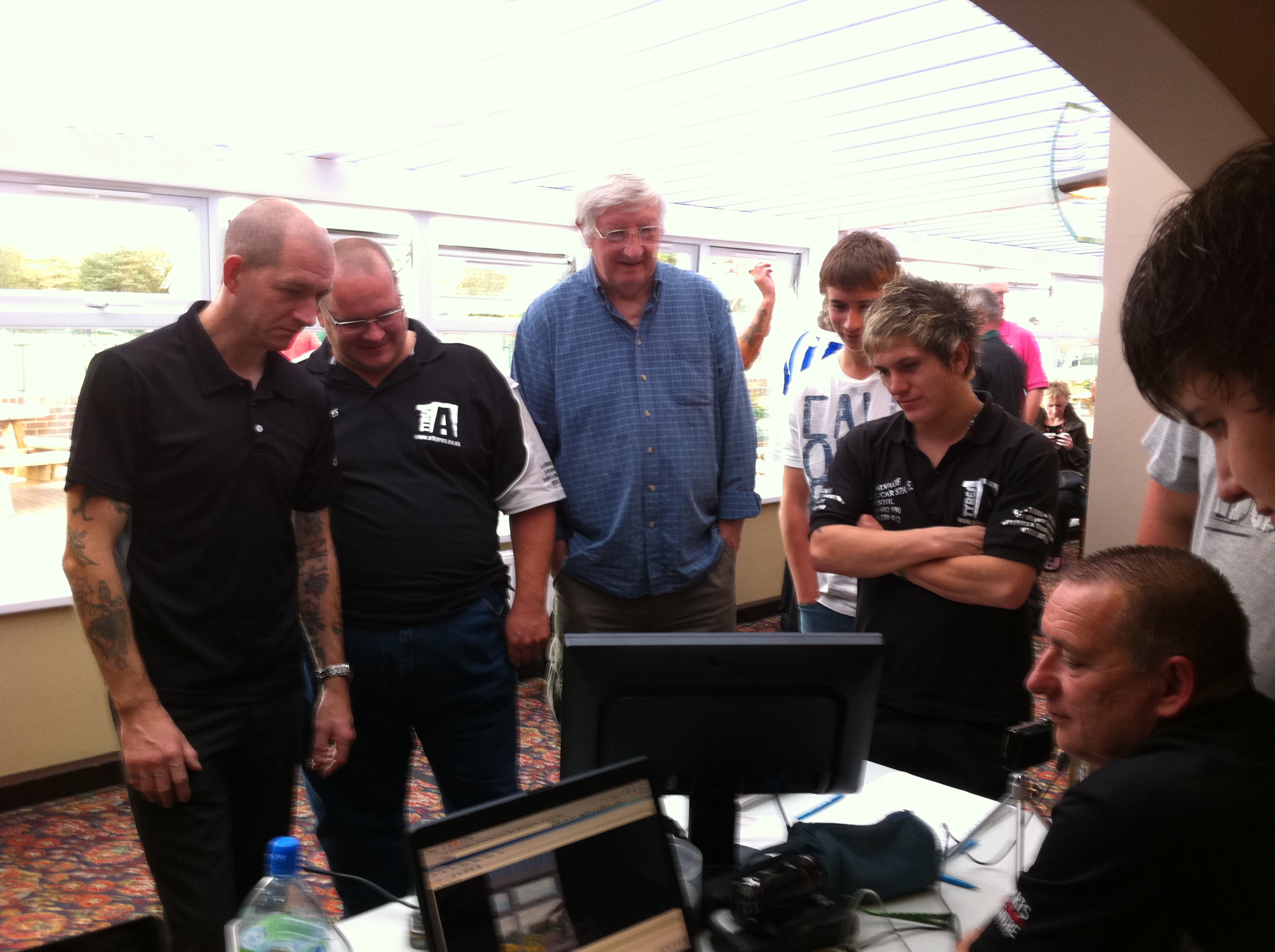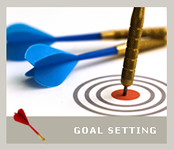
Coaching Clinic 5
Posted: 12.10.11 in Coaching Clinic Blog category
This month we discuss the benefits of taking to yourself during a game and how splitting a darts match into three parts can help your practice.
Over the past month my colleague Andrew Humphrey and I have been out and about meeting and coaching dart players. It has been fascinating. We started off with the pub team, The Kasbah a few months ago. We recently visited a group of county players in Nottingham as well as a player with aspirations to progress through the PDC via the Q School in January. We learn a lot about dart players during these visits. However, the one thing that strikes us after each session we do, whatever level you are at, you can always still improve. That goes for us as coaches too!

What are you talking about?
The one area that fascinates the dart players we meet is the psychological side of the sport. The most visited area on our website is the sports science section and it is full of good advice. One of the most popular psychological skills to learn is positive self-talk.
Research shows that self-talk is a skill used by successful sports people as a way of coaching themselves during a performance and of motivating themselves too. We have worked with players who remind themselves vocally that it is the treble they want or give themselves a little reminder to help stay focused.
Regular readers of this article will have worked out by now that I do bang on about practice whenever I get the opportunity. Well here I go again. Research has also shown that self-talk works best if you use your key words during practice. Why? Because you start to form good habits; after a while the words you use will become a natural part of your preparation to throw. This way when you are in a match you will not have to think about this part of your game. There is enough going on in a match without having to think about talking to yourself!
Figure that out?
My colleague Andrew Humphrey demonstrated to some of our clients recently how misleading the 3 dart average can be. He gave examples of a player with an average of 83.50 winning the leg over a 93.93 average and a similar scenario of 100.2 beating 115.61. Of course who threw first was the answer to the riddle but how many times have you heard players say, “how did I lose with an average like that?” Plenty of times? Yes me too!
The 3 dart average is the darts statistic of choice but it’s not a friend of ours when we try to assess the true ability of a player. For example, even with our sports science qualifications behind us and a powerful computer we can’t tell which part of the game was the key reason for whatever average a player scored; was it high scoring but poor finishing or was it the other way around?
We break a game of darts into three phases to help us understand how a player has performed:
Phase 1 – The first 9 darts – This is the crucial scoring phase of the game.
Phase 2 – Reaching 170 or fewer. This is the phase of the game where a player uses their brain as well as their darts. A “clever player” will be planning their route to the checkout which will give them the best percentage chance of checking out.
Phase 3 -The checkout – hitting the double. This is the phase where the leg is literally won or lost.
There are numerous benefits to having this data on your performance. However, the most important is it can help you plan your practice schedule. Yes it is the P word again but how else are you going to play better darts without practising? More importantly how else are you going to improve unless you know what areas you need to focus on. If you don’t you will always remain an average player!
.....................................................................................................................
The Darts Performance Centre is a resource to assist dart players of all standards play better darts. The site is arranged as an on-line coaching manual. There is advice on technique, nerves, psychology, goal setting, practice games, an area to log your statistics and an interactive area where your darting questions are answered by two sports scientists, one with 30 years dart playing experience! Membership is just £25.00 per annum.
We also offer group coaching days and we will shortly be arriving at a darts centre near you for one on one video analysis sessions - please register for free to join our mailing list to find out when and where we will be.
Post by Category
Posts by Month
- November 2025
- October 2025
- September 2025
- August 2025
- July 2025
- June 2025
- May 2025
- April 2025
- March 2025
- February 2025
- January 2025
- December 2024
- December 2024
- November 2024
- October 2024
- September 2024
- August 2024
- July 2024
- June 2024
- May 2024
- April 2024
- March 2024
- February 2024
- January 2024
- December 2023
- December 2023
- November 2023
- October 2023
- September 2023
- August 2023
- July 2023
- June 2023
- May 2023
- April 2023
- March 2023
- February 2023
- January 2023
- December 2022
- December 2022
- November 2022
- October 2022
- September 2022
- August 2022
- July 2022
- June 2022
- May 2022
- April 2022
- March 2022
- February 2022
- January 2022
- December 2021
- December 2021
- November 2021
- October 2021
- September 2021
- August 2021
- July 2021
- June 2021
- May 2021
- April 2021
- March 2021
- February 2021
- January 2021
- December 2020
- December 2020
- November 2020
- October 2020
- September 2020
- August 2020
- July 2020
- June 2020
- May 2020
- April 2020
- March 2020
- February 2020
- January 2020
- December 2019
- December 2019
- November 2019
- October 2019
- September 2019
- August 2019
- July 2019
- June 2019
- May 2019
- April 2019
- March 2019
- February 2019
- January 2019
- December 2018
- December 2018
- November 2018
- October 2018
- September 2018
- August 2018
- July 2018
- June 2018
- May 2018
- April 2018
- March 2018
- February 2018
- January 2018
- December 2017
- December 2017
- November 2017
- October 2017
- September 2017
- August 2017
- July 2017
- June 2017
- May 2017
- April 2017
- March 2017
- February 2017
- January 2017
- December 2016
- December 2016
- November 2016
- October 2016
- September 2016
- August 2016
- July 2016
- June 2016
- May 2016
- April 2016
- March 2016
- February 2016
- January 2016
- December 2015
- December 2015
- November 2015
- October 2015
- September 2015
- August 2015
- July 2015
- June 2015
- May 2015
- April 2015
- March 2015
- February 2015
- January 2015
- December 2014
- December 2014
- November 2014
- October 2014
- September 2014
- August 2014
- July 2014
- June 2014
- May 2014
- April 2014
- March 2014
- February 2014
- January 2014
- December 2013
- December 2013
- November 2013
- October 2013
- September 2013
- August 2013
- July 2013
- June 2013
- May 2013
- April 2013
- March 2013
- February 2013
- January 2013
- December 2012
- December 2012
- November 2012
- October 2012
- September 2012
- August 2012
- July 2012
- June 2012
- May 2012
- April 2012
- March 2012
- February 2012
- January 2012
- December 2011
- December 2011
- November 2011
- October 2011
- September 2011
- August 2011
- July 2011
- June 2011
- May 2011
- April 2011
- March 2011
- February 2011
- January 2011
- December 2010
- December 2010
- November 2010
Main Index







.jpg)
.jpg)
